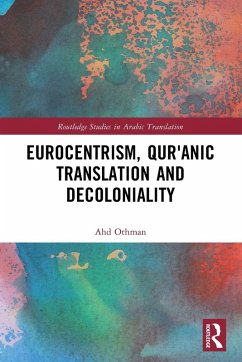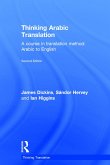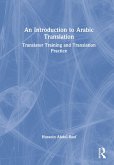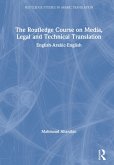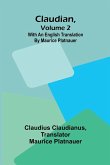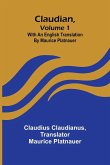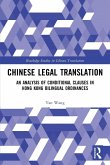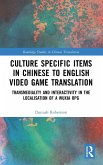Ahd Othman
Eurocentrism, Qur¿anic Translation and Decoloniality
Ahd Othman
Eurocentrism, Qur¿anic Translation and Decoloniality
- Broschiertes Buch
- Merkliste
- Auf die Merkliste
- Bewerten Bewerten
- Teilen
- Produkt teilen
- Produkterinnerung
- Produkterinnerung
Eurocentrism, Qur¿anic Translation and Decoloniality contributes to the understanding of Eurocentrism in Translation Studies and engages with the concept through the lens of scholarship on Arabic and Qur¿an translation.
Andere Kunden interessierten sich auch für
![Thinking Arabic Translation Thinking Arabic Translation]() James DickinsThinking Arabic Translation169,99 €
James DickinsThinking Arabic Translation169,99 €![An Introduction to Arabic Translation An Introduction to Arabic Translation]() Hussein Abdul-RaofAn Introduction to Arabic Translation152,99 €
Hussein Abdul-RaofAn Introduction to Arabic Translation152,99 €![The Routledge Course on Media, Legal and Technical Translation The Routledge Course on Media, Legal and Technical Translation]() Mahmoud AltarabinThe Routledge Course on Media, Legal and Technical Translation174,99 €
Mahmoud AltarabinThe Routledge Course on Media, Legal and Technical Translation174,99 €![Claudian, Volume 2; With An English Translation By Maurice Platnauer Claudian, Volume 2; With An English Translation By Maurice Platnauer]() Claudius ClaudianusClaudian, Volume 2; With An English Translation By Maurice Platnauer19,99 €
Claudius ClaudianusClaudian, Volume 2; With An English Translation By Maurice Platnauer19,99 €![Claudian, Volume 1; With An English Translation By Maurice Platnauer Claudian, Volume 1; With An English Translation By Maurice Platnauer]() Claudius ClaudianusClaudian, Volume 1; With An English Translation By Maurice Platnauer20,99 €
Claudius ClaudianusClaudian, Volume 1; With An English Translation By Maurice Platnauer20,99 €![Chinese Legal Translation Chinese Legal Translation]() Wang YanChinese Legal Translation57,99 €
Wang YanChinese Legal Translation57,99 €![Culture Specific Items in Chinese to English Video Game Translation Culture Specific Items in Chinese to English Video Game Translation]() Dariush RobertsonCulture Specific Items in Chinese to English Video Game Translation181,99 €
Dariush RobertsonCulture Specific Items in Chinese to English Video Game Translation181,99 €-
-
-
Eurocentrism, Qur¿anic Translation and Decoloniality contributes to the understanding of Eurocentrism in Translation Studies and engages with the concept through the lens of scholarship on Arabic and Qur¿an translation.
Produktdetails
- Produktdetails
- Verlag: Routledge
- Seitenzahl: 216
- Erscheinungstermin: 29. September 2025
- Englisch
- Abmessung: 234mm x 156mm x 12mm
- Gewicht: 336g
- ISBN-13: 9781032520940
- ISBN-10: 1032520949
- Artikelnr.: 75290275
- Herstellerkennzeichnung
- Libri GmbH
- Europaallee 1
- 36244 Bad Hersfeld
- gpsr@libri.de
- Verlag: Routledge
- Seitenzahl: 216
- Erscheinungstermin: 29. September 2025
- Englisch
- Abmessung: 234mm x 156mm x 12mm
- Gewicht: 336g
- ISBN-13: 9781032520940
- ISBN-10: 1032520949
- Artikelnr.: 75290275
- Herstellerkennzeichnung
- Libri GmbH
- Europaallee 1
- 36244 Bad Hersfeld
- gpsr@libri.de
Ahd Othman, Visiting Research Associate at the University of Bristol
Arabic transliteration key Acknowledgements Introduction Chapter I - Eurocentrism: a conceptual framework 1.1 Europe as a cultural unity 1.2 Greece and Rome 1.3 The Judeo-Christian tradition 1.4 Enlightenment and science 1.5 European superiority: solipsism and power Eurocentrism's problems in TS 1.6 Reservations about the critique of Eurocentrism Conclusion Chapter II - Quantifying Eurocentrism: a bibliometric approach 2.1 Sampling Arabic translation 2.2 Bibliometrics 2.3 Quantifying Eurocentrism 2.4 Scope of data and tools 2.5 Data results and analysis 2.5.1 The Bibliography of Interpreting and Translation (BITRA) 2.5.2 The Translation Studies Bibliography (TSB) Limitations of the bibliometric approach 2.6 Methodologies, scientificity and Eurocentrism The qualitative-quantitative divide Conclusion Chapter III - Eurocentrism through a qualitative lens: the case of Qur
an translation 3.1 Sampling Qur
an translation 3.2 Thematic Analysis 3.3 Themes and subthemes identified in the articles 3.3.1 Qur
an translation with biblical touchstones (a) Christian translators' key role in Qur
an translation history (b) Biblical referentiality (c) (Un)translatability (d) Linguistic focus and Translation Quality Assessment (TQA) 3.3.2 Politics of representation (e) The Qur
an in the scheme of things (f) Regimes of epistemic authority (g) Macro-narratives Conclusion Chapter IV - Decoloniality, liberation theology and translation 4.1 Reference works 4.2 Decoloniality and Translation Studies 4.3 Decoloniality and liberatory Islam Islamic liberation theology 4.4 Tawhid and Qur
an translation Implications for translation 4.5 Other 'others' Conclusion Concluding remarks Appendix 1: 50 most frequent words in the 'subject' field of the BITRA sample Appendix 2: 25 most frequent words in the 'keyword' field of the TSB sample Appendix 3: Codes generated and compiled after the first coding sweep Appendix 4: Codes refined and grouped after the second coding sweep Index
an translation 3.1 Sampling Qur
an translation 3.2 Thematic Analysis 3.3 Themes and subthemes identified in the articles 3.3.1 Qur
an translation with biblical touchstones (a) Christian translators' key role in Qur
an translation history (b) Biblical referentiality (c) (Un)translatability (d) Linguistic focus and Translation Quality Assessment (TQA) 3.3.2 Politics of representation (e) The Qur
an in the scheme of things (f) Regimes of epistemic authority (g) Macro-narratives Conclusion Chapter IV - Decoloniality, liberation theology and translation 4.1 Reference works 4.2 Decoloniality and Translation Studies 4.3 Decoloniality and liberatory Islam Islamic liberation theology 4.4 Tawhid and Qur
an translation Implications for translation 4.5 Other 'others' Conclusion Concluding remarks Appendix 1: 50 most frequent words in the 'subject' field of the BITRA sample Appendix 2: 25 most frequent words in the 'keyword' field of the TSB sample Appendix 3: Codes generated and compiled after the first coding sweep Appendix 4: Codes refined and grouped after the second coding sweep Index
Arabic transliteration key Acknowledgements Introduction Chapter I - Eurocentrism: a conceptual framework 1.1 Europe as a cultural unity 1.2 Greece and Rome 1.3 The Judeo-Christian tradition 1.4 Enlightenment and science 1.5 European superiority: solipsism and power Eurocentrism's problems in TS 1.6 Reservations about the critique of Eurocentrism Conclusion Chapter II - Quantifying Eurocentrism: a bibliometric approach 2.1 Sampling Arabic translation 2.2 Bibliometrics 2.3 Quantifying Eurocentrism 2.4 Scope of data and tools 2.5 Data results and analysis 2.5.1 The Bibliography of Interpreting and Translation (BITRA) 2.5.2 The Translation Studies Bibliography (TSB) Limitations of the bibliometric approach 2.6 Methodologies, scientificity and Eurocentrism The qualitative-quantitative divide Conclusion Chapter III - Eurocentrism through a qualitative lens: the case of Qur
an translation 3.1 Sampling Qur
an translation 3.2 Thematic Analysis 3.3 Themes and subthemes identified in the articles 3.3.1 Qur
an translation with biblical touchstones (a) Christian translators' key role in Qur
an translation history (b) Biblical referentiality (c) (Un)translatability (d) Linguistic focus and Translation Quality Assessment (TQA) 3.3.2 Politics of representation (e) The Qur
an in the scheme of things (f) Regimes of epistemic authority (g) Macro-narratives Conclusion Chapter IV - Decoloniality, liberation theology and translation 4.1 Reference works 4.2 Decoloniality and Translation Studies 4.3 Decoloniality and liberatory Islam Islamic liberation theology 4.4 Tawhid and Qur
an translation Implications for translation 4.5 Other 'others' Conclusion Concluding remarks Appendix 1: 50 most frequent words in the 'subject' field of the BITRA sample Appendix 2: 25 most frequent words in the 'keyword' field of the TSB sample Appendix 3: Codes generated and compiled after the first coding sweep Appendix 4: Codes refined and grouped after the second coding sweep Index
an translation 3.1 Sampling Qur
an translation 3.2 Thematic Analysis 3.3 Themes and subthemes identified in the articles 3.3.1 Qur
an translation with biblical touchstones (a) Christian translators' key role in Qur
an translation history (b) Biblical referentiality (c) (Un)translatability (d) Linguistic focus and Translation Quality Assessment (TQA) 3.3.2 Politics of representation (e) The Qur
an in the scheme of things (f) Regimes of epistemic authority (g) Macro-narratives Conclusion Chapter IV - Decoloniality, liberation theology and translation 4.1 Reference works 4.2 Decoloniality and Translation Studies 4.3 Decoloniality and liberatory Islam Islamic liberation theology 4.4 Tawhid and Qur
an translation Implications for translation 4.5 Other 'others' Conclusion Concluding remarks Appendix 1: 50 most frequent words in the 'subject' field of the BITRA sample Appendix 2: 25 most frequent words in the 'keyword' field of the TSB sample Appendix 3: Codes generated and compiled after the first coding sweep Appendix 4: Codes refined and grouped after the second coding sweep Index

